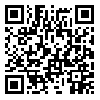Volume 10, Issue 1 (Autumn 2024)
Health in Emergencies and Disasters Quarterly 2024, 10(1): 59-66 |
Back to browse issues page
Download citation:
BibTeX | RIS | EndNote | Medlars | ProCite | Reference Manager | RefWorks
Send citation to:



BibTeX | RIS | EndNote | Medlars | ProCite | Reference Manager | RefWorks
Send citation to:
Shams N, Abbasi Dolatabadi Z, Haqqani S, Delkhosh M. Relationship Between COVID-19-related Anxiety and Changes in Lifestyle Behaviors Among Older Adults in Iran. Health in Emergencies and Disasters Quarterly 2024; 10 (1) :59-66
URL: http://hdq.uswr.ac.ir/article-1-565-en.html
URL: http://hdq.uswr.ac.ir/article-1-565-en.html
1- Department of Community Health and Geriatric Nursing, School of Nursing and Midwifery, Tehran University of Medical Sciences, Tehran, Iran., دانشکده پرستاری و مامایی دانشگاه علوم پزشکی تهران
2- Department of Medical-Surgical Nursing, School of Nursing and Midwifery, Tehran University of Medical Sciences, Tehran, Iran., دانشکده پرستاری و مامایی دانشگاه علوم پزشکی تهران
3- Nursing Care Research Center, School of Nursing and Midwifery, Iran University of Medical Sciences, Tehran, Iran., دانشكده پرستاري و مامايي، دانشگاه علوم پزشـكي ايـران
4- Department of Community Health and Geriatric Nursing, School of Nursing and Midwifery, Tehran University of Medical Sciences, Tehran, Iran. ,delkhoshmarjan@gmail.com
2- Department of Medical-Surgical Nursing, School of Nursing and Midwifery, Tehran University of Medical Sciences, Tehran, Iran., دانشکده پرستاری و مامایی دانشگاه علوم پزشکی تهران
3- Nursing Care Research Center, School of Nursing and Midwifery, Iran University of Medical Sciences, Tehran, Iran., دانشكده پرستاري و مامايي، دانشگاه علوم پزشـكي ايـران
4- Department of Community Health and Geriatric Nursing, School of Nursing and Midwifery, Tehran University of Medical Sciences, Tehran, Iran. ,
Abstract: (2329 Views)
Background: The emergence of COVID-19 caused significant changes in the lifestyle of older adults and developed psychological disorders such as anxiety. This study aims to evaluate the relationship between anxiety caused by COVID-19 and changes in the lifestyle behaviors of older adults in Iran.
Materials and Methods: This descriptive-correlational study with a cross-sectional design was conducted on 265 older adults covered by the comprehensive health service centers in Zanjan, Iran in 2022. They were selected using a convenience sampling method from among randomly selected comprehensive health centers. Data was collected using a demographic form, Bernardo’s coronavirus pandemic anxiety scale, and Kumari’s lifestyle-related behavior change scale. Descriptive statistics (frequency, percentage, Mean±SD) were used to describe the data. Pearson’s correlation test was utilized to examine the relationship between the study variables in SPSS software, version 16.
Results: All participants had severe anxiety (Mean total score: 22.23+3.47). The mean score for the non-somatic symptoms of anxiety (11.55+2.34) was higher than that of somatic symptoms (10.67+1.94). The mean score of changes in lifestyle behaviors indicated the occurrence of more unfavorable changes (-2.38±7.13). A negative and significant correlation was found between COVID-19-related anxiety and lifestyle behavior changes among older adults (P<0.001).
Conclusion: There is a negative and significant relationship between COVID-19-related anxiety (somatic and non-somatic) and changes in lifestyle behaviors (exercise/physical activity, eating habits, and sleep/rest) among Iranian older adults. Due to the possibility of similar pandemics in the future, it is necessary to provide educational, supportive, and counseling programs to them to improve their healthy lifestyle behaviors and control their anxiety levels.
Materials and Methods: This descriptive-correlational study with a cross-sectional design was conducted on 265 older adults covered by the comprehensive health service centers in Zanjan, Iran in 2022. They were selected using a convenience sampling method from among randomly selected comprehensive health centers. Data was collected using a demographic form, Bernardo’s coronavirus pandemic anxiety scale, and Kumari’s lifestyle-related behavior change scale. Descriptive statistics (frequency, percentage, Mean±SD) were used to describe the data. Pearson’s correlation test was utilized to examine the relationship between the study variables in SPSS software, version 16.
Results: All participants had severe anxiety (Mean total score: 22.23+3.47). The mean score for the non-somatic symptoms of anxiety (11.55+2.34) was higher than that of somatic symptoms (10.67+1.94). The mean score of changes in lifestyle behaviors indicated the occurrence of more unfavorable changes (-2.38±7.13). A negative and significant correlation was found between COVID-19-related anxiety and lifestyle behavior changes among older adults (P<0.001).
Conclusion: There is a negative and significant relationship between COVID-19-related anxiety (somatic and non-somatic) and changes in lifestyle behaviors (exercise/physical activity, eating habits, and sleep/rest) among Iranian older adults. Due to the possibility of similar pandemics in the future, it is necessary to provide educational, supportive, and counseling programs to them to improve their healthy lifestyle behaviors and control their anxiety levels.
Type of article: Research |
Subject:
Quantitative
Received: 2023/08/25 | Accepted: 2024/05/25 | Published: 2024/10/1
Received: 2023/08/25 | Accepted: 2024/05/25 | Published: 2024/10/1
Send email to the article author
| Rights and permissions | |
 |
This work is licensed under a Creative Commons Attribution-NonCommercial 4.0 International License. |








